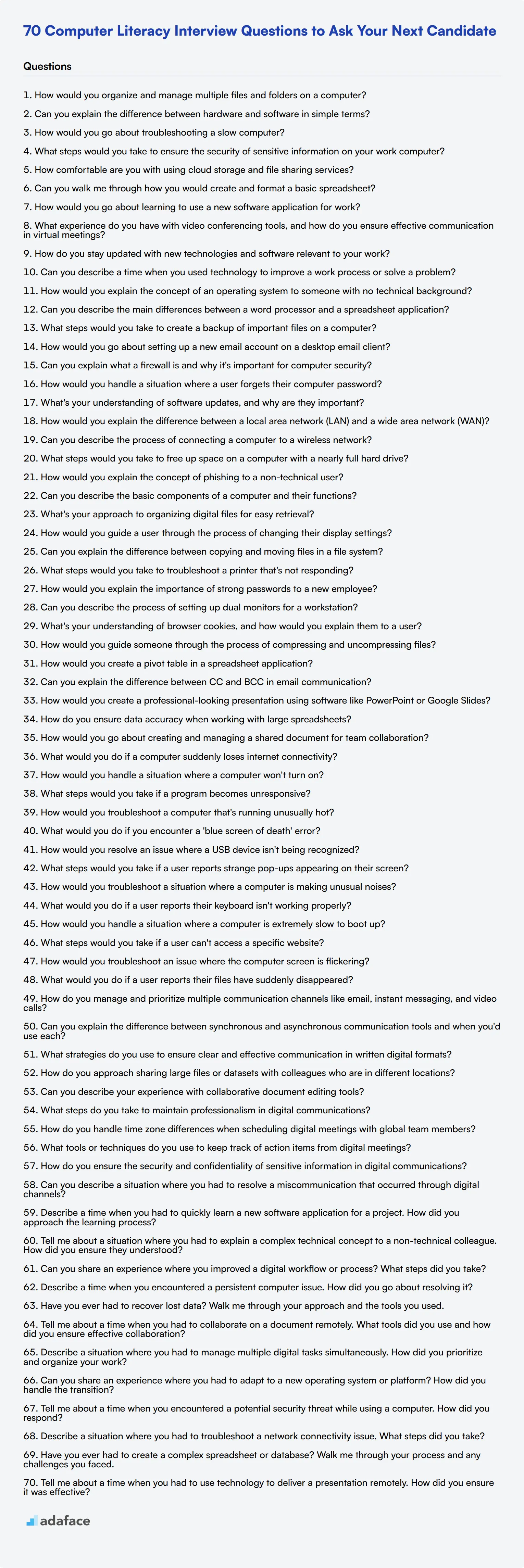In today's digital age, computer literacy is a fundamental skill for most job roles. As an interviewer, asking the right questions to assess a candidate's computer proficiency can help you make informed hiring decisions and ensure your team has the necessary technical capabilities.
This blog post provides a comprehensive list of computer literacy interview questions tailored for various scenarios and skill levels. From basic software usage to troubleshooting and digital communication, we cover a wide range of topics to help you evaluate candidates effectively.
By using these questions, you can gain valuable insights into a candidate's computer skills and their ability to adapt to your organization's technological needs. Consider complementing your interviews with a computer literacy test to get a more complete picture of candidates' abilities.
Table of contents
Top 10 Computer Literacy questions to ask in interviews
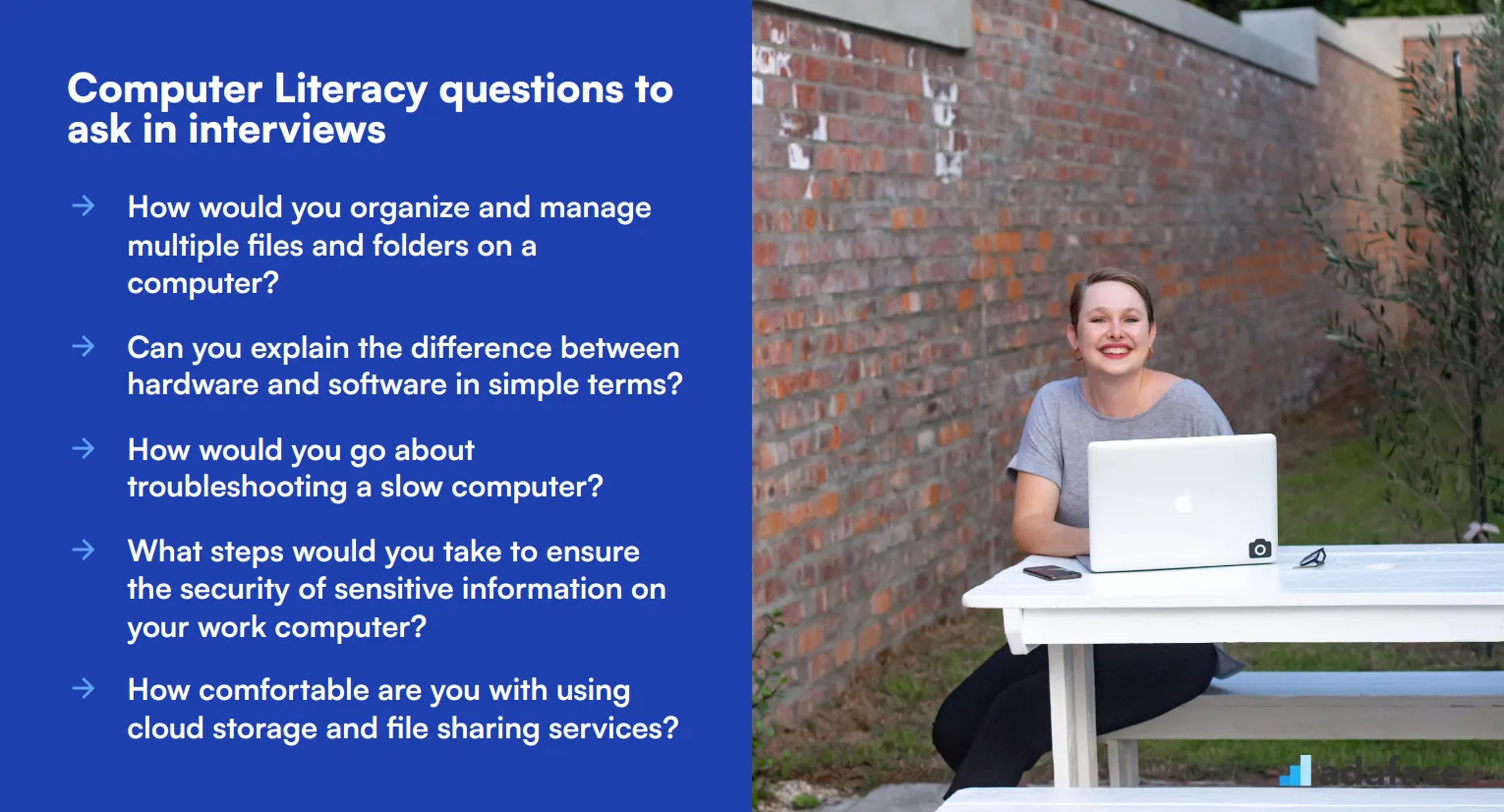
Ready to assess your candidates' computer literacy? These top 10 questions will help you gauge their digital prowess without turning the interview into a tech convention. Use them to uncover how well potential hires can navigate the digital landscape and contribute to your team's technological efficiency.
1. How would you organize and manage multiple files and folders on a computer?
An ideal answer should demonstrate the candidate's ability to create a logical file structure. They might mention:
- Creating main folders for broad categories (e.g., 'Work Projects', 'Personal Documents')
- Using subfolders to further organize content (e.g., 'Work Projects > Client A', 'Client B')
- Implementing a consistent naming convention for files (e.g., 'YYYYMMDD_ProjectName_Version')
- Regularly archiving or deleting unnecessary files to maintain organization
Look for candidates who emphasize the importance of a system that allows for easy retrieval and collaboration. Their approach should reflect an understanding of efficient digital organization.
2. Can you explain the difference between hardware and software in simple terms?
A good response should clearly distinguish between the physical components (hardware) and the programs that run on them (software). For example:
- Hardware: The physical parts of a computer you can touch, like the monitor, keyboard, mouse, and the computer itself.
- Software: The programs and applications that run on the hardware, like Microsoft Word, web browsers, or the operating system.
Listen for analogies that make the concept easy to understand, such as comparing a computer to a car where the hardware is the physical car and the software is the fuel that makes it run. This demonstrates the candidate's ability to explain technical concepts in layman's terms, a valuable skill in many work environments.
3. How would you go about troubleshooting a slow computer?
A comprehensive answer should outline a step-by-step approach to diagnosing and resolving performance issues. Look for responses that include:
- Checking for and closing unnecessary programs running in the background
- Running a virus scan to check for malware
- Clearing browser cache and temporary files
- Checking available disk space and freeing up space if needed
- Considering a system update or upgrade if the problem persists
The ideal candidate should demonstrate a methodical approach to problem-solving and a basic understanding of factors that can affect computer performance. Their answer might also include when it's appropriate to seek help from IT support, showing awareness of their own limitations.
4. What steps would you take to ensure the security of sensitive information on your work computer?
A strong answer should cover multiple aspects of digital security. Key points to look for include:
- Using strong, unique passwords and changing them regularly
- Enabling two-factor authentication where possible
- Being cautious with email attachments and links from unknown sources
- Keeping software and antivirus programs up-to-date
- Using encryption for sensitive files or communications
- Locking the computer when stepping away from the desk
The ideal candidate should demonstrate an understanding of the importance of data protection and the role of individual responsibility in maintaining cybersecurity. Look for awareness of company policies and a proactive attitude towards security measures.
5. How comfortable are you with using cloud storage and file sharing services?
An effective answer should showcase familiarity with popular cloud services and their benefits. Look for mentions of:
- Specific cloud storage platforms (e.g., Google Drive, Dropbox, OneDrive)
- Understanding of basic features like file syncing and sharing
- Awareness of privacy settings and permissions when sharing files
- Experience with collaborative features for real-time editing
The ideal candidate should express confidence in using these tools and highlight how they've used cloud services to improve workflow or collaboration in previous roles. Their response should also indicate an openness to learning new systems if your company uses a specific platform.
6. Can you walk me through how you would create and format a basic spreadsheet?
A good response should outline the fundamental steps of creating and formatting a spreadsheet. Key points to listen for:
- Opening the spreadsheet software (e.g., Excel, Google Sheets)
- Entering data into cells
- Adjusting column widths and row heights
- Applying basic formatting (bold, italics, cell colors)
- Using simple formulas for calculations (sum, average)
- Creating a header row and freezing panes
Look for candidates who can explain the process clearly and mention any additional features they're familiar with, such as creating charts or using pivot tables. This demonstrates their level of proficiency with spreadsheet software, which is crucial for many office roles.
7. How would you go about learning to use a new software application for work?
An ideal answer should demonstrate a proactive and resourceful approach to learning. Look for strategies such as:
- Exploring the software's built-in tutorials or help documentation
- Searching for online resources like video tutorials or user forums
- Practicing with sample data or in a test environment
- Asking colleagues for tips or guidance
- Taking advantage of any company-provided training sessions
The best candidates will show enthusiasm for learning new tools and a self-directed approach to skill development. Their answer should reflect adaptability and a growth mindset, which are valuable traits in rapidly evolving tech environments.
8. What experience do you have with video conferencing tools, and how do you ensure effective communication in virtual meetings?
A strong answer should demonstrate familiarity with popular video conferencing platforms and best practices for virtual communication. Look for mentions of:
- Experience with specific tools (e.g., Zoom, Microsoft Teams, Google Meet)
- Understanding of features like screen sharing, chat functions, and breakout rooms
- Strategies for engaging participants and encouraging interaction
- Awareness of proper virtual meeting etiquette (muting when not speaking, appropriate backgrounds)
- Troubleshooting common technical issues
The ideal candidate should show adaptability to remote work environments and an understanding of how to maintain professionalism and productivity in virtual settings. Their response might also touch on the importance of clear communication and follow-up in a digital workspace.
9. How do you stay updated with new technologies and software relevant to your work?
An effective answer should showcase a proactive approach to continuous learning. Look for methods such as:
- Following industry blogs, podcasts, or YouTube channels
- Participating in online forums or professional social media groups
- Attending webinars, workshops, or conferences
- Subscribing to industry newsletters or publications
- Experimenting with new tools or beta versions of software
The ideal candidate should demonstrate genuine interest in technological advancements and a commitment to professional development. Their answer might also include how they've applied new knowledge to improve their work processes or solve problems creatively.
10. Can you describe a time when you used technology to improve a work process or solve a problem?
A strong response should include a specific example that demonstrates the candidate's ability to apply technology practically. Look for:
- A clear description of the problem or inefficiency
- The technological solution they implemented
- The process of researching and choosing the solution
- The outcome and benefits of the implementation
- Any challenges faced and how they were overcome
The ideal answer will showcase the candidate's initiative, problem-solving skills, and ability to leverage technology for business improvement. It should also reflect their capacity to evaluate the effectiveness of their solution and adapt as needed.
20 Computer Literacy interview questions to ask junior administrators
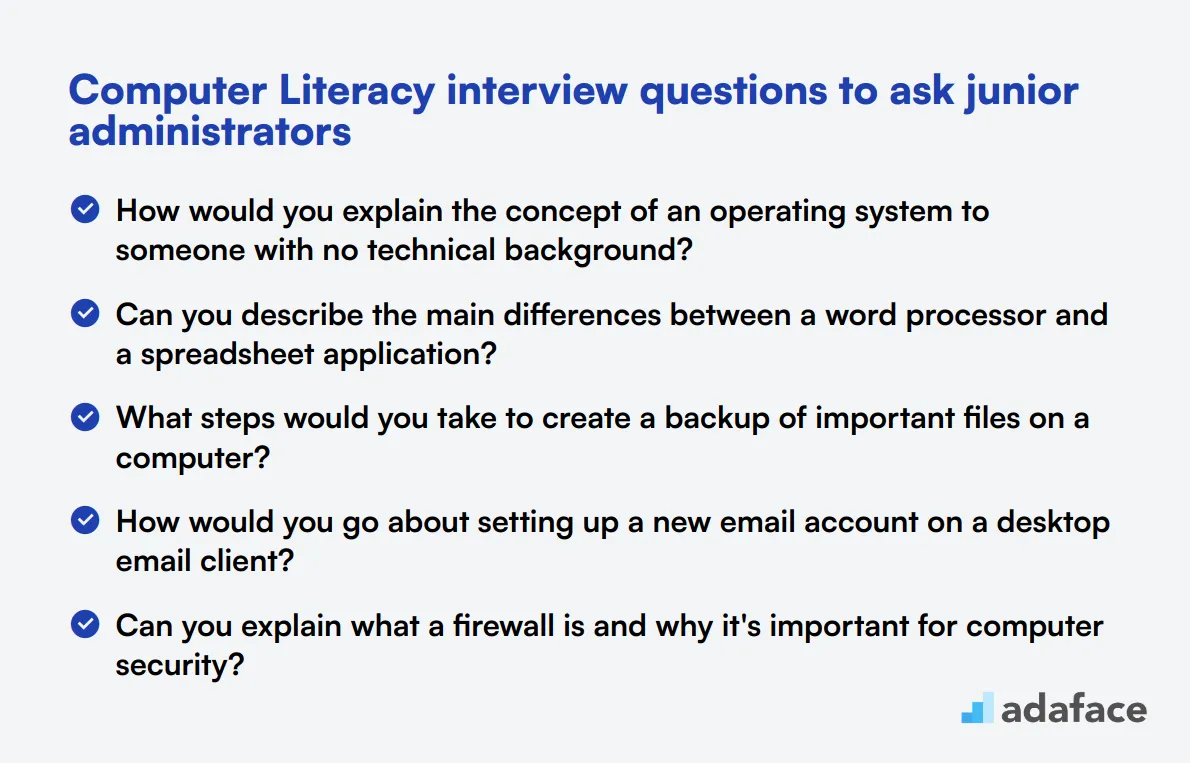
When interviewing junior administrators for IT consultant roles, it's crucial to assess their basic computer literacy skills. Use these questions to gauge candidates' understanding of fundamental concepts and their ability to perform essential tasks in a professional setting.
- How would you explain the concept of an operating system to someone with no technical background?
- Can you describe the main differences between a word processor and a spreadsheet application?
- What steps would you take to create a backup of important files on a computer?
- How would you go about setting up a new email account on a desktop email client?
- Can you explain what a firewall is and why it's important for computer security?
- How would you handle a situation where a user forgets their computer password?
- What's your understanding of software updates, and why are they important?
- How would you explain the difference between a local area network (LAN) and a wide area network (WAN)?
- Can you describe the process of connecting a computer to a wireless network?
- What steps would you take to free up space on a computer with a nearly full hard drive?
- How would you explain the concept of phishing to a non-technical user?
- Can you describe the basic components of a computer and their functions?
- What's your approach to organizing digital files for easy retrieval?
- How would you guide a user through the process of changing their display settings?
- Can you explain the difference between copying and moving files in a file system?
- What steps would you take to troubleshoot a printer that's not responding?
- How would you explain the importance of strong passwords to a new employee?
- Can you describe the process of setting up dual monitors for a workstation?
- What's your understanding of browser cookies, and how would you explain them to a user?
- How would you guide someone through the process of compressing and uncompressing files?
5 Computer Literacy interview questions and answers related to software usage
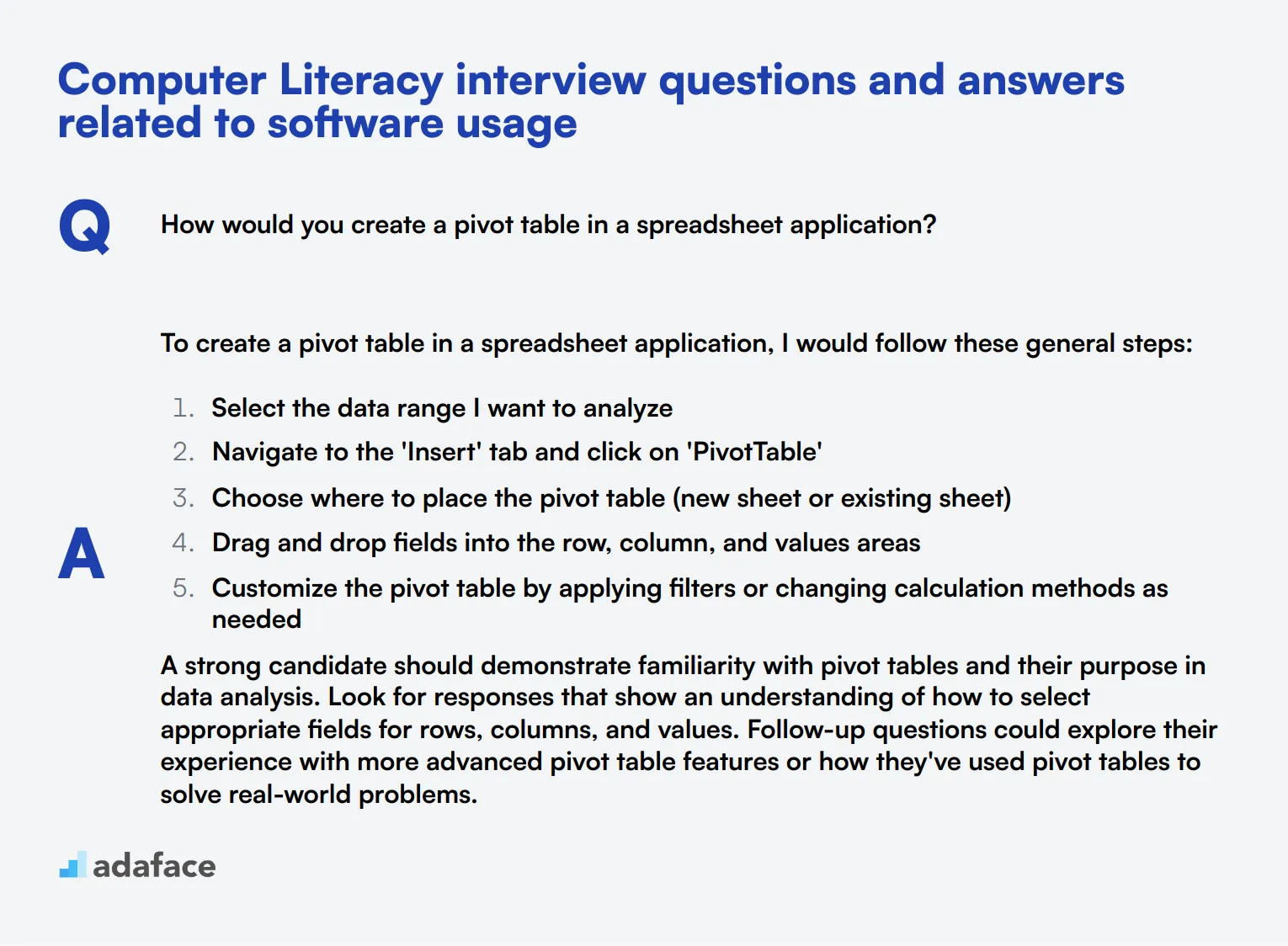
When assessing a candidate's software usage skills, it's crucial to ask questions that reveal their practical knowledge and adaptability. The following set of questions will help you gauge a candidate's proficiency with common software applications and their ability to leverage technology in a professional setting.
1. How would you create a pivot table in a spreadsheet application?
To create a pivot table in a spreadsheet application, I would follow these general steps:
- Select the data range I want to analyze
- Navigate to the 'Insert' tab and click on 'PivotTable'
- Choose where to place the pivot table (new sheet or existing sheet)
- Drag and drop fields into the row, column, and values areas
- Customize the pivot table by applying filters or changing calculation methods as needed
A strong candidate should demonstrate familiarity with pivot tables and their purpose in data analysis. Look for responses that show an understanding of how to select appropriate fields for rows, columns, and values. Follow-up questions could explore their experience with more advanced pivot table features or how they've used pivot tables to solve real-world problems.
2. Can you explain the difference between CC and BCC in email communication?
CC stands for 'Carbon Copy,' and BCC stands for 'Blind Carbon Copy.' Both are used to send copies of an email to additional recipients:
- CC: Recipients in the CC field receive a copy of the email, and their email addresses are visible to all other recipients.
- BCC: Recipients in the BCC field also receive a copy, but their email addresses are hidden from all other recipients, including those in the To and CC fields.
A good answer should emphasize the importance of using BCC for privacy and to prevent unnecessary 'Reply All' responses. Look for candidates who understand the etiquette and professional implications of using CC and BCC appropriately in various communication scenarios.
3. How would you create a professional-looking presentation using software like PowerPoint or Google Slides?
To create a professional-looking presentation, I would follow these steps:
- Choose a consistent, clean theme or template
- Use a clear, readable font and maintain consistent sizing
- Incorporate relevant images, charts, or graphs to support key points
- Keep text concise, using bullet points for easy readability
- Ensure color contrast for better visibility
- Add subtle animations or transitions to enhance engagement
- Include a clear introduction and conclusion slide
- Proofread for errors and ensure logical flow between slides
An ideal candidate should demonstrate an understanding of visual design principles and the importance of clarity in presentations. Look for answers that emphasize the balance between aesthetics and content, as well as awareness of the audience's perspective. You might follow up by asking about their experience with specific features of presentation software or how they adapt presentations for different audiences.
4. How do you ensure data accuracy when working with large spreadsheets?
To ensure data accuracy in large spreadsheets, I would employ the following strategies:
- Use data validation tools to restrict input types and ranges
- Implement formulas and functions to automate calculations and reduce human error
- Regularly use the spell-check and error-checking features
- Create and use named ranges for easier formula referencing
- Utilize conditional formatting to highlight outliers or potential errors
- Regularly back up the spreadsheet to prevent data loss
- Use filters and sorting to review data for inconsistencies
- Implement version control to track changes over time
A strong candidate should demonstrate a methodical approach to data management and an understanding of the tools available in spreadsheet applications. Look for answers that show attention to detail and proactive error prevention. Consider asking follow-up questions about their experience handling specific data accuracy challenges or their familiarity with advanced spreadsheet functions.
5. How would you go about creating and managing a shared document for team collaboration?
To create and manage a shared document for team collaboration, I would follow these steps:
- Choose an appropriate platform (e.g., Google Docs, Microsoft 365)
- Create the document with a clear structure and initial content
- Set up sharing permissions, ensuring team members have appropriate access
- Use the platform's commenting and suggesting features for feedback
- Implement version history to track changes and revert if necessary
- Establish clear guidelines for editing and commenting
- Use the notification system to keep team members updated on changes
- Regularly review and incorporate feedback to maintain document relevance
An ideal response should demonstrate familiarity with collaborative software features and an understanding of effective team communication. Look for candidates who emphasize the importance of clear guidelines, version control, and maintaining document integrity. You might ask follow-up questions about their experience resolving conflicts in collaborative documents or strategies for ensuring all team members contribute effectively.
13 Computer Literacy interview questions about basic troubleshooting
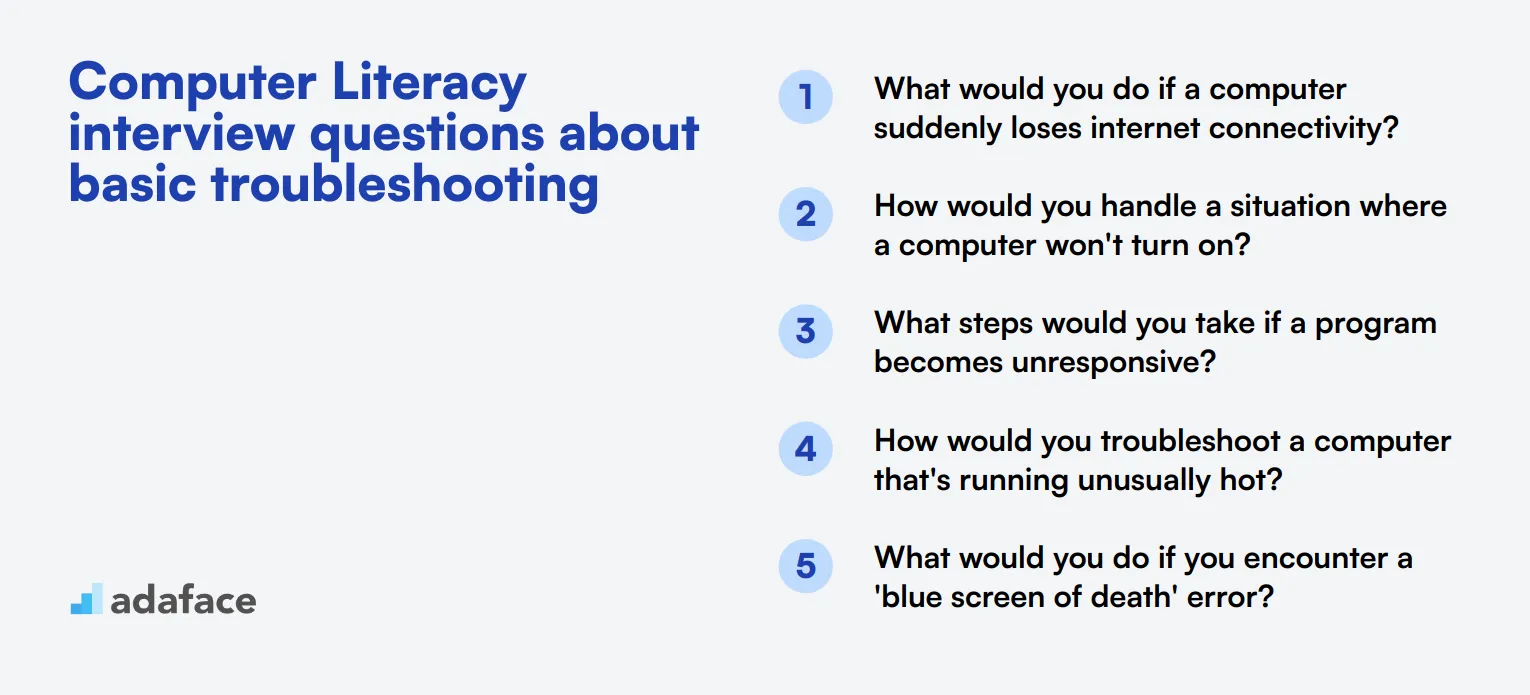
To assess candidates' ability to handle common technical issues, consider using these basic troubleshooting questions. They help evaluate an applicant's problem-solving skills and technical understanding, which are crucial for roles requiring computer literacy.
- What would you do if a computer suddenly loses internet connectivity?
- How would you handle a situation where a computer won't turn on?
- What steps would you take if a program becomes unresponsive?
- How would you troubleshoot a computer that's running unusually hot?
- What would you do if you encounter a 'blue screen of death' error?
- How would you resolve an issue where a USB device isn't being recognized?
- What steps would you take if a user reports strange pop-ups appearing on their screen?
- How would you troubleshoot a situation where a computer is making unusual noises?
- What would you do if a user reports their keyboard isn't working properly?
- How would you handle a situation where a computer is extremely slow to boot up?
- What steps would you take if a user can't access a specific website?
- How would you troubleshoot an issue where the computer screen is flickering?
- What would you do if a user reports their files have suddenly disappeared?
10 Computer Literacy interview questions about digital communication
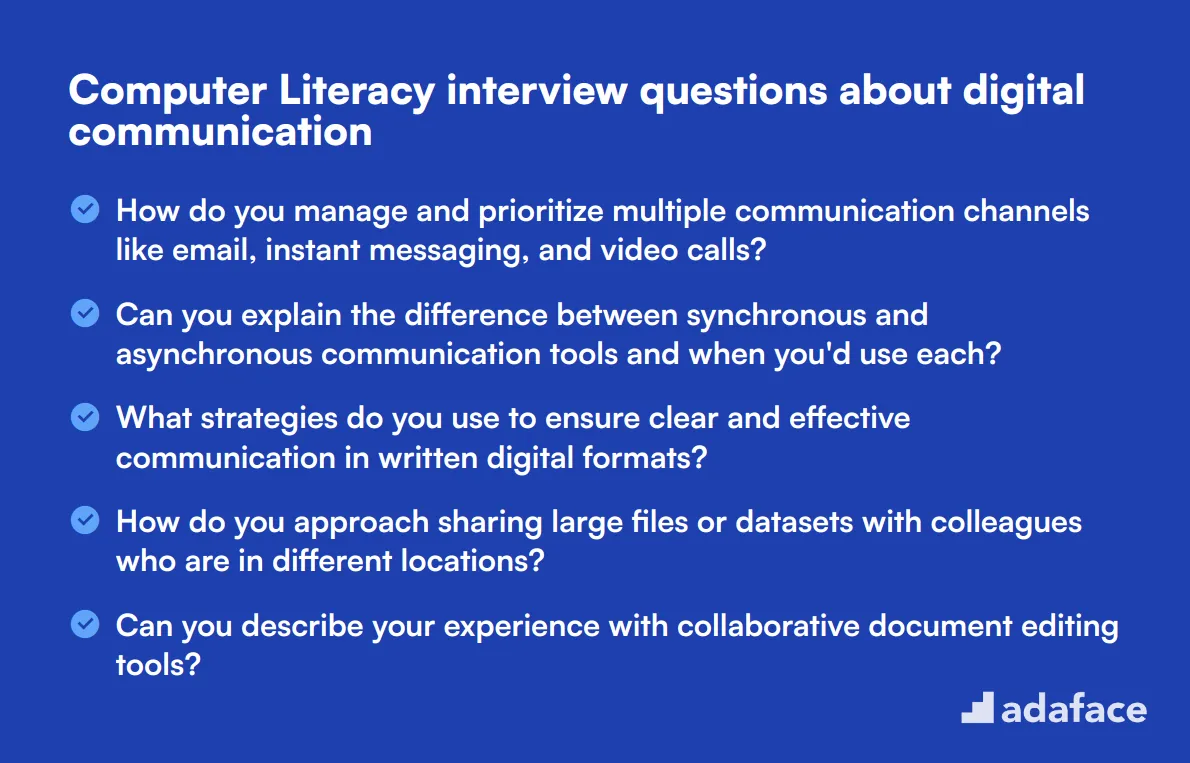
In today's digital workplace, effective communication skills are crucial. Use these 10 computer literacy interview questions to assess candidates' proficiency in digital communication tools and practices. These questions will help you gauge how well applicants can collaborate and interact in a modern, tech-driven work environment.
- How do you manage and prioritize multiple communication channels like email, instant messaging, and video calls?
- Can you explain the difference between synchronous and asynchronous communication tools and when you'd use each?
- What strategies do you use to ensure clear and effective communication in written digital formats?
- How do you approach sharing large files or datasets with colleagues who are in different locations?
- Can you describe your experience with collaborative document editing tools?
- What steps do you take to maintain professionalism in digital communications?
- How do you handle time zone differences when scheduling digital meetings with global team members?
- What tools or techniques do you use to keep track of action items from digital meetings?
- How do you ensure the security and confidentiality of sensitive information in digital communications?
- Can you describe a situation where you had to resolve a miscommunication that occurred through digital channels?
12 behavioral Computer Literacy interview questions
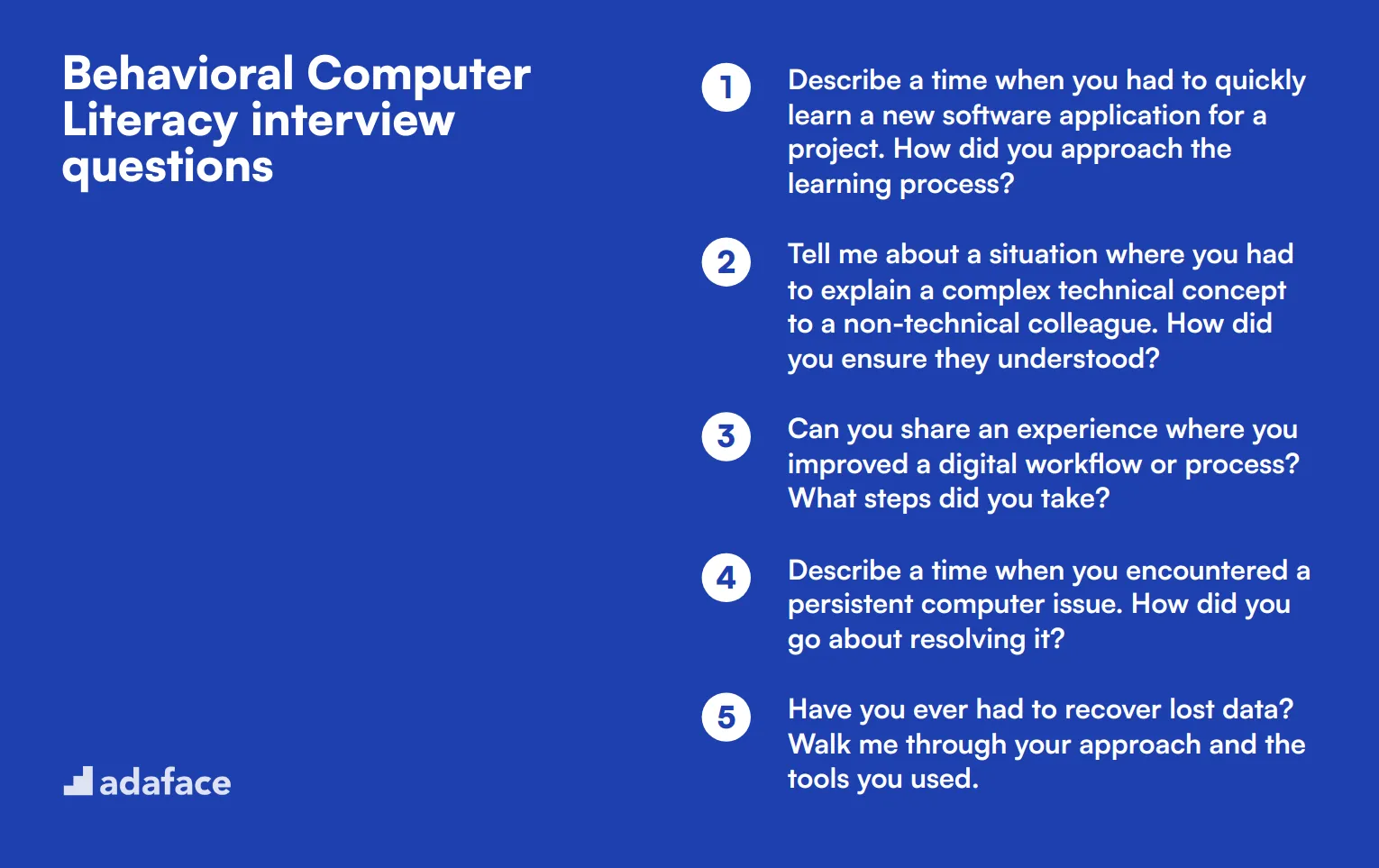
To assess a candidate's practical computer literacy skills, consider using these behavioral interview questions. These queries help gauge how applicants apply their knowledge in real-world scenarios, offering insights into their problem-solving abilities and adaptability to various tech-related situations.
- Describe a time when you had to quickly learn a new software application for a project. How did you approach the learning process?
- Tell me about a situation where you had to explain a complex technical concept to a non-technical colleague. How did you ensure they understood?
- Can you share an experience where you improved a digital workflow or process? What steps did you take?
- Describe a time when you encountered a persistent computer issue. How did you go about resolving it?
- Have you ever had to recover lost data? Walk me through your approach and the tools you used.
- Tell me about a time when you had to collaborate on a document remotely. What tools did you use and how did you ensure effective collaboration?
- Describe a situation where you had to manage multiple digital tasks simultaneously. How did you prioritize and organize your work?
- Can you share an experience where you had to adapt to a new operating system or platform? How did you handle the transition?
- Tell me about a time when you encountered a potential security threat while using a computer. How did you respond?
- Describe a situation where you had to troubleshoot a network connectivity issue. What steps did you take?
- Have you ever had to create a complex spreadsheet or database? Walk me through your process and any challenges you faced.
- Tell me about a time when you had to use technology to deliver a presentation remotely. How did you ensure it was effective?
Which Vue JS skills should you evaluate during the interview phase?
Evaluating computer literacy skills during the interview phase can be challenging. While it's impossible to assess everything in one interview, focusing on a few key skills can give you a solid understanding of a candidate's capabilities. Below, we highlight the essential computer literacy skills that you should evaluate.
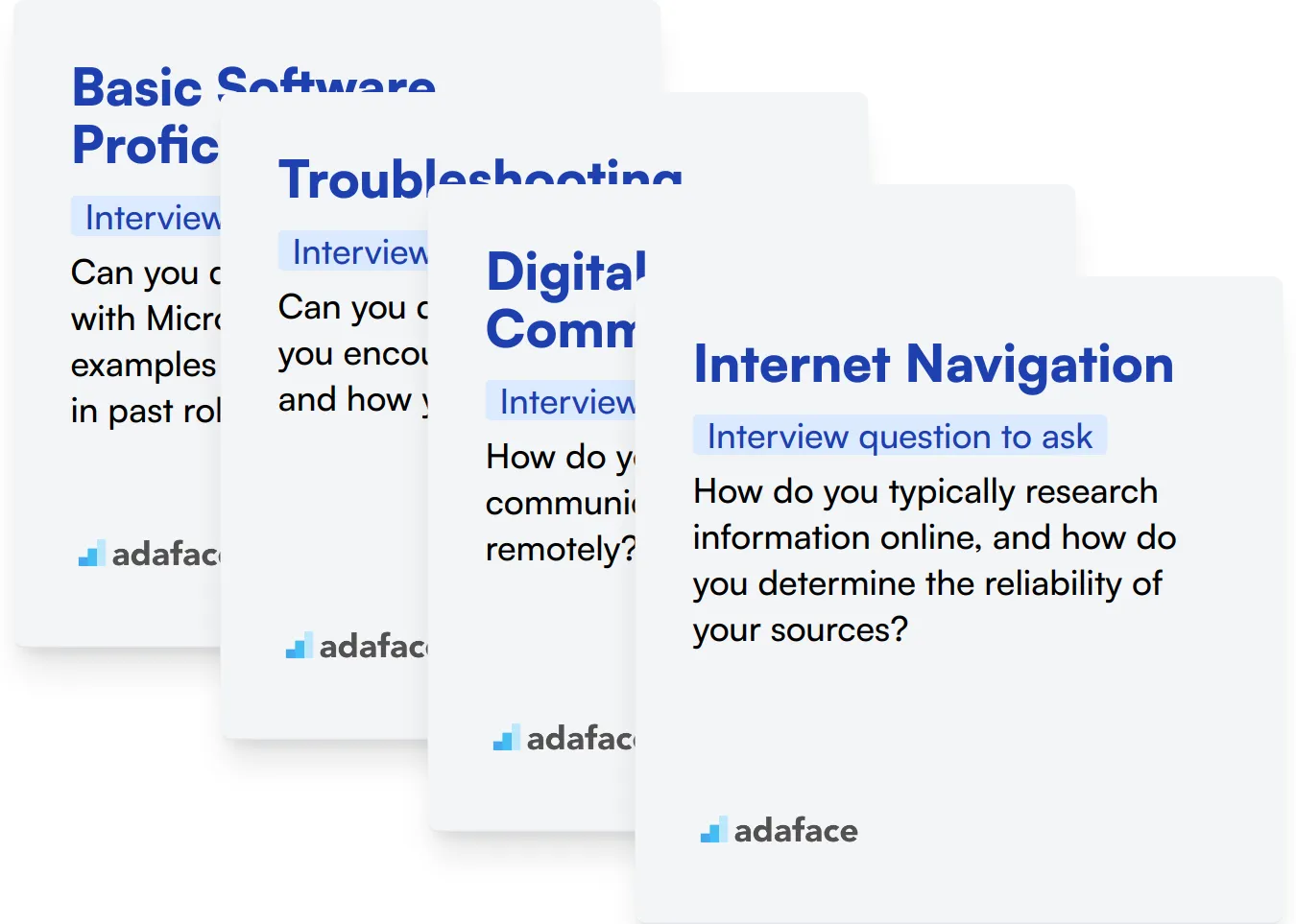
Basic Software Proficiency
Basic software proficiency is foundational for any role that involves computer usage. This skill ensures the candidate is comfortable with essential software tools such as Microsoft Office, Google Workspace, or similar platforms.
Using an assessment test with relevant MCQs can efficiently filter candidates for this skill. Consider leveraging our computer-literacy-test.
You can also ask targeted questions during the interview to evaluate this skill.
Can you describe your experience with Microsoft Excel and provide examples of how you have used it in past roles?
Look for answers that demonstrate familiarity with basic and advanced features of Excel, such as functions, pivot tables, and data visualization tools.
Troubleshooting
Basic troubleshooting skills are essential for resolving common technical issues, which can help in maintaining productivity and minimizing downtime.
A specialized assessment test can gauge a candidate's troubleshooting skills. Consider our technical-support-test.
Ask targeted questions to understand their troubleshooting capabilities.
Can you describe a time when you encountered a technical issue and how you resolved it?
Listen for a structured approach to identifying and solving technical problems, showcasing their logical thinking and problem-solving skills.
Digital Communication
Effective digital communication is crucial in today's remote and hybrid work environments. This involves proficiency with email, chat platforms, and video conferencing tools.
Using an assessment test with relevant MCQs can filter candidates for digital communication skills. Our communication-test can be particularly useful here.
You can ask direct questions to gauge their comfort and experience with digital communication tools.
How do you ensure effective communication when working remotely?
Look for answers that show an understanding of best practices in digital communication, such as timely responses, clarity in messaging, and proficiency with tools like Slack or Zoom.
Internet Navigation
Navigating the internet efficiently is a basic yet critical skill. It includes knowing how to search for information, evaluate sources, and utilize online tools and resources.
An assessment test with relevant MCQs can help filter candidates for internet navigation skills. Consider our basic-computer-skills-test.
Inquire about their experience and strategies for finding reliable information online.
How do you typically research information online, and how do you determine the reliability of your sources?
Look for a systematic approach to online research and an ability to distinguish credible sources from unreliable ones.
3 Strategies for Effectively Using Computer Literacy Interview Questions
Before you start putting your learning into practice, consider these valuable tips to enhance your interview process.
1. Incorporate Skills Tests Before Interviews
Using skills tests before interviews can filter candidates based on their actual abilities rather than just resumes. This step ensures that only qualified candidates proceed to the interview stage, saving you time and resources.
Relevant tests to consider include the Computer Literacy Test and the Basic Computer Skills Test. These tests assess essential skills that directly relate to a candidate's ability to perform in the role.
Implementing these assessments creates a structured foundation for your hiring process, allowing you to focus on candidates who are genuinely capable, thus seamlessly transitioning to the next step: developing your interview questions.
2. Curate Focused Interview Questions
When conducting interviews, it's essential to ask only a select number of relevant questions to maximize your evaluation of candidates. This approach helps you concentrate on the most critical aspects, ensuring a more effective hiring decision.
Consider integrating questions related to digital communication, basic troubleshooting, and software usage that align with the role. You might also explore questions about communication skills and cultural fit to further gauge candidate suitability.
By limiting your questions while ensuring they cover various relevant skills, you can streamline the interview process and gather the most pertinent information to inform your hiring decision.
3. Utilize Follow-Up Questions
Simply asking initial interview questions won't provide a complete picture of a candidate's abilities. It's important to incorporate follow-up questions to uncover deeper insights and clarify any vague responses.
For instance, if you ask a candidate how they would troubleshoot a common software issue, a good follow-up question could be: 'Can you walk me through a specific instance where you used that approach?' This helps you assess their practical experience and problem-solving capabilities more effectively.
Hire Skilled Computer Literate Professionals with Targeted Assessments
Looking to hire someone with strong computer literacy skills? Make sure you're evaluating candidates accurately. The best way to do this is by using skill tests. Our Computer Literacy Test and Basic Computer Skills Test can help you identify top candidates quickly.
After using these tests to shortlist the best applicants, you can proceed with interviews. Ready to streamline your hiring process? Sign up for Adaface or explore our Online Assessment Platform to get started.
Computer Literacy Test
Download Vue JS interview questions template in multiple formats
Vue JS Interview Questions FAQs
Computer literacy refers to the ability to efficiently use computers and related technology, including software, hardware, and the internet.
Computer literacy is vital as it enables employees to perform various tasks efficiently, boosting productivity and ensuring effective digital communication.
Skills assessed include software usage, basic troubleshooting, digital communication, and overall familiarity with computer systems and applications.
Evaluate a candidate's computer literacy through targeted interview questions, practical assessments, and reviewing their experience with relevant software and technologies.
Common tools include word processors, spreadsheets, email clients, web browsers, and basic operating system functionalities like file management.
It depends on the role. For positions heavily reliant on technology, lack of computer literacy can be a significant disadvantage, whereas for roles with minimal tech use, it might be less critical.

40 min skill tests.
No trick questions.
Accurate shortlisting.
We make it easy for you to find the best candidates in your pipeline with a 40 min skills test.
Try for freeRelated posts
Free resources




